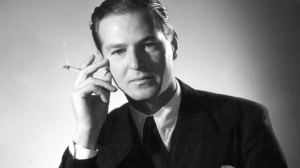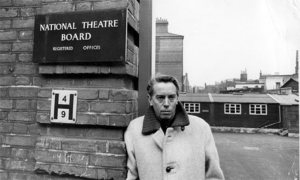My notes: How did we get here and, where are we going? Seminar by James Hudson.
Drama historically started with the text, especially the single-author playwright configuration.
“…of English theatre in the twentieth century, this at least can be said, that it is better than the English theatre of the ninetieth century” (B. Ifor Evans, 1948).
The Bricks and Mortar men, where wealthily individuals who monopolised theatre during the beginning of the 20th century, based on a star system. They used famous faces to draw in crowds to performances and owned most of the established theatres within London during this time-period. If they lost capital on a production they would simply sell the theatre recovering any loss they had before undergoing any given production. (Similar to the current financial outlook on western American theatre regarding commercialism, I.e. Broadway.)
Terrance Rattigan 1911-1977.
Terrance Rattigan, displaying his acute Britishness.
- Prestigious British theatrical critic Terrance Rattigan, who was mainly known for work that was concerned with probing aspects of the heart, and used his mise en scène (some kind of simulation or recreation of what the audience would be used to, I.e. a drawing room or a parlour). His theatre is arguably not for the well-educated, however for those that are looking for an easy-going pastime or the idea of an intellectual appearance which is ultimately a façade for the passive spectator to become lost in. As Terrance Rattigan stated, he imagined his ideal theatre goes as being “Aunt Edna” a spectator who is interested in the idea of art and what it means, however, does so in an unconnected, uncomplex manner and uninformed way simply put – (challenge your theatre-goer at your peril.)
“A playwright must be his own his own audience. A novelist may lose his readers for a few pages; a playwright never dares lose his audience for a minute.”
Terrance Rattigan
Kenneth Tynan 1927-1980.
Kenneth Tynan photographed outside of the National Theatre’s Board’s Office.
He was theatrical provocateur and controversial in views extremely outspoken and the first person to say “Fuck” on British-television during a live-broadcast.
Predominately known as a 50’s theatre critic both in Britain and America. Kenneth Tynan was offered a job in New York which carried with it a huge amount of cultural power.
Was keen for the British establishment to reinvent itself or pull something from the American continent in reinvention. (The idea that theatre writers where a small pool of talent and attempts should be made to explore beyond this.) Theatre is boring when it is about the middle-class.
The idea that of the theatre writers, writing from a Kensington flat for the girl they love: merely to break the ice.
“Not content to have the audience in the palm of his hand, he goes one further and clinches his fist.”
Kenneth Tynan.
***
Important moments.
George Devine, Quote taken from their mission statement which in those days, it was revolutionary statement about attracting young people to the theatre. (The right to fail: attributed to Tony Richardson, we have an obligation to do an obligation that might not work, that represent risk and challenging, that might challenge the audience.) Making a statement of pushing the perimeters of what is normally seen on stage.
The Royal Court is one of the most important theatrical companies, as it dragged British theatrical culture into the modern age. Seen as “the writer’s theatre.”
Joan Littlewood within her company there is no strict hierarchy, everyone was allowed an equal voice. No division, understood Brecht and brought his theatrical thinking’s and methodologies to the mainstream UK.
The formation of The English Stage Company. The Royal Court and its importance in premiering the important writing for the next year or so.
Waiting for Godot (1955), Samuel Beckett didn’t think of himself of a dramatist, wrote that in a break from writing for Novellas. He wrote them and then had them translated so he had complete control over his work.
British theatre had censorship since 1737. Until Edward Bond: 1965-68. Scripts had to be submitted to the office of the lord-chamberlain. And had strict penalties for content that contained the following sex, god, royal family, swearing and politics among others. However, there was a loop-hole in the law where a (public) theatre company could not put on a show that had been refused, however a private company could.
1968 Edward Bond submitted a further play which returned from the censor i.e. the Lord Chamberlin with one note: “His Lordship would not allow it”. This ultimately was the moment which led to a general realization and questioning about the ludicrousness and restraints of the censorship system, and the censorship ceased to exist.
Peter Hall. The RSC founded 1960, The National Theatre opens with Hamlet, which premiered the founding of the British National Theatre.
***
Playwrights: 60’s, 70’s, 80’s.
Plays from the perspective of being written by the playwright.
Edward Bond Marxist: Society needs to become democratic.
Harold Pinter was writing about power and domination. Won the Nobel-prize in (2003) his speech was about politics, Iraq and the issues around 9/11 and the invasion of Chile.
The overall effect of Carol Churchill and the theatrical world becoming more experimental under her influence.
Joe Orton’s text that helped redefine farce as it was known in mainstream theatre in favour of political satire and mockery of the established social, economic principles.
90’s The New Face of Writing.
Blasted (1995) was important and was written by Sarah Kane and later was coined as “in-yer-face theatre” However, is better described as experiancial, e.g. (for the audience to feel as if it has been through some kind of theatrical experience.) Arguably there is no such thing as “in-yer-face theatre”– This opened the wider theatrical world to new types of playwriting.
Theatre became about who is the new best playwright? Who is young, and who has a story to tell? Who and what can sell? Through this thinking there was an influx of new, diverse writing which ultimately outshined historically theatrically successful established writers, in favor of new untold or explored work. In essence more working-class theatre.
The New Writing of The 90’s – It’s the process of how it gets there. Theatrical productions begin to change because drama groups want to encourage this process as there is financial gain and these performances and texts are marketable e.g. Shopping and Fucking (1997) (The idea of the me-and-my mates play, also the idea that playwrights are young, urban-people that write texts about their experiences of life that feature a cast of people that can be related to from a working perspective, narrowing down the focus.) Young playwrights are encouraged to write about their own lives – Auto Ethnography, relevant and current work that will sell to a wider demographic outside of the typical bourgeois theatrical communities.
Onwards, where are we heading?
The rise of the popularity of the verbatim text and play with its emphasis on the importance of the now. Popular culture and the rise of Site-specific and Site-generic theatre. The idea and questioning of theatre itself namely, why does theatre, have to be in a theatre? The idea that theatre in theatre is boring and also the exploration of taking theatre out of its “given” or “conventional” space.
The arguably pending downfall or unappreciated theatrical critic and the idea that no one cares about reviews anymore (not in the conventional journalistic sense). 2000 onwards, and the rise of the new-wave bloggers and the mentality of a society that is driven by constantly validating their views and opinions to wider communities or peers.
Work Cited.
Evans, B. Ifor (1948) A Short History of English Drama. London: Pelican.

